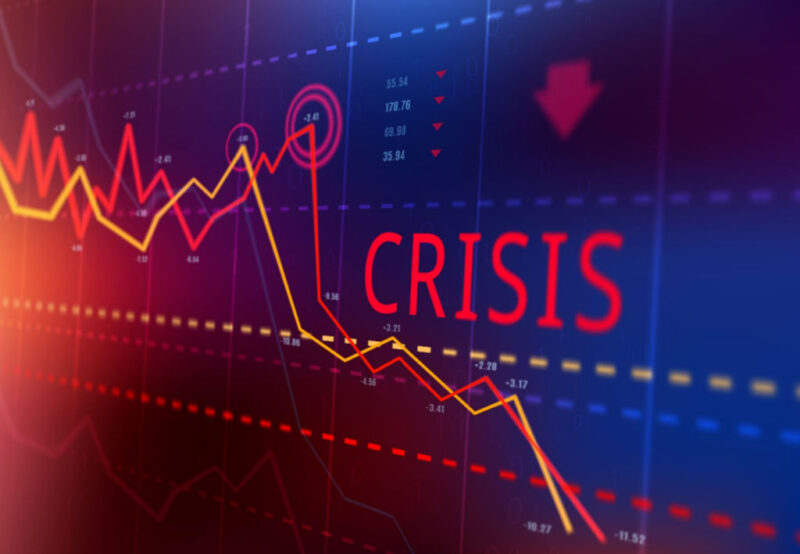You could say we’re critical of the Bank of England here at Fortune & Freedom. Nigel Farage certainly didn’t pull any punches in our recent video…
But I come to praise our monetary Caesar, not to bury it. After all, at least the BoE has admitted it’s doing a terrible job. Which stands in stark contrast to its peers around the world, who are still in denial.
Last week, the BoE unleashed chaos by being the first major policy-making institution to admit we’re in for a severe recession. Households will suffer the biggest income squeeze on record, which goes back to 1963, in real terms.
The Telegraph sums it up:
This is a bigger drop in living standards than during the financial crisis, the slump of the early 1990s or the stagflationary turmoil of the 1970s, even taking into account government help with energy bills.
After the BoE’s expected recession, the economy will be smaller than before the pandemic!
This prediction diverged dramatically from what the US Federal Reserve and the US Treasury have been saying. Which is completely bizarre given it’s the US economy that has shrunk for two consecutive quarters, not the UK’s.
Here’s the interesting bit though. Despite admitting we’re in for a rough time, the BoE raised rates by the most since 1995.
This is a combination I never expected to read in the media. A central bank forecasting a severe prolonged economic downturn and announcing a highly unusual rapid tightening of monetary policy at the same time.
I’ve been telling you for years that central bankers were walking a tightrope. Inflation on the one side, recession on the other. And yet, somehow, they’ve managed to fall off both sides at the same time.
Except they’re not falling off, but jumping into the abyss. And telling everyone about it too.
The reason why the BoE is still tightening is obvious: inflation is still roaring. And yet, inflation is higher in the EU without causing the same doom-mongering there…
While the BoE governor is harangued everywhere he goes, the European Central Bank merely has to put up with its ratings on Google Maps being cut…
It’s the inflation forecast that counts. And the BoE’s economists – a rogue band known for making outlandish predictions – now expect inflation to hit 13% while the economy shrinks 2.1% for more than a year.
Such predictions are amusing because they admit the inability of the central bank to rein in inflation. If its mandate is around 2% and it’s not expecting 2% anytime soon, then what does that tell you about the Bank’s abilities? And what does it tell you about its sincerity to bring inflation back down?
Perhaps I’m being harsh. Perhaps the Monetary Policy Committee just got confused. Someone should tell them its mandate is 2% inflation, not 2% recession.
Christopher Snowdon from the Institute of Economic Affairs said what we’re all thinking: “If my only job was keeping inflation at 2% but inflation was 9% and I expected it to rise to 13%, I’d like to think I would have the decency to resign, even if I was earning £575,000 a year.” It’s the same vibe from the mainstream media in Australia, by the way. But not yet in Europe or the US to the same extent.
The BoE’s forecast of its own policy is concerning too. Especially when, as The Daily Mail wrote, “predictions that it [the interest rate] will hit 3% to 4% by the end of this year ‘may not be sufficient’, one former BofE executive said today.”
Financial markets, meanwhile, seem unimpressed with the BoE’s daring feat of… I don’t know what to call it. Predicting your own failure is not a good look for a policy-maker.
While the pound has melted down against the US dollar, so have other currencies. And the pound is not the worst of the lot, by far.
Stock markets didn’t move much either, which surprised me a great deal given an important policy-making institution has admitted the severity of the downturn to come.
Usually, the worse central bankers expect things to get, the more the markets rally because it implies that central bankers are expected to do more to aid a recovery. But, this time, you’ve got both inflation and a recession, so nobody knows which of the two gets priority in policy-making.
To be fair, I’m genuinely impressed with the BoE on this one. It takes guts to make the predictions it did. Especially while the rest of the world’s central bankers say otherwise. It’s quite rare for central banks to anticipate recessions, let alone signal they are willing to hike interest rates going into one.
Why exactly the BoE has broken ranks and given a gloomy forecast is of course a complete mystery to anyone who believes policy-makers are implementing Brexit in good faith. As for the rest of us… we know why the Bank is allowed to be pessimistic.
Ironically, the BoE’s doom mongering may actually be good news. The UK is one step ahead of other economies now. The first step to solving your problems is admitting you have one, after all. And we can certainly say the BoE sees problems.
If tight monetary policy is what the world needs in order to get back to a sound footing in the long run, then the UK may be ahead of the game, with a central bank willing to tackle problems.
Not many central banks are willing to declare their intentions to hike rates into a recession, let alone do it. The German Bundesbank was another rare example. Which bodes well for the pound in the long term.
But only in relative terms. Once inflation does come down (likely because of a crisis) and the recession becomes the priority again, the BoE will be paying for its own mistakes by creating the money we need to keep this rickety system going again. It’ll be stimulus, quantitative easing and 0% rates again.
Which really means that you and I will be paying for the crisis in the end. As John Maynard Keynes quoted Lenin, “There is no subtler, no surer means of overturning the existing basis of society than to debauch the currency. The process engages all the hidden forces of economic law on the side of destruction, and does it in a manner which not one man in a million is able to diagnose.”
I hope I’m improving those odds…
At some point, I expect central banks to go the way of the Pay Board, the Price Commission and the Prices and Incomes Board. They’ll be abolished.
We may even get a new Competition Act, but this time, it might be competition in currencies instead. Find out what has me so optimistic, here.

Nick Hubble
Editor, Fortune & Freedom




